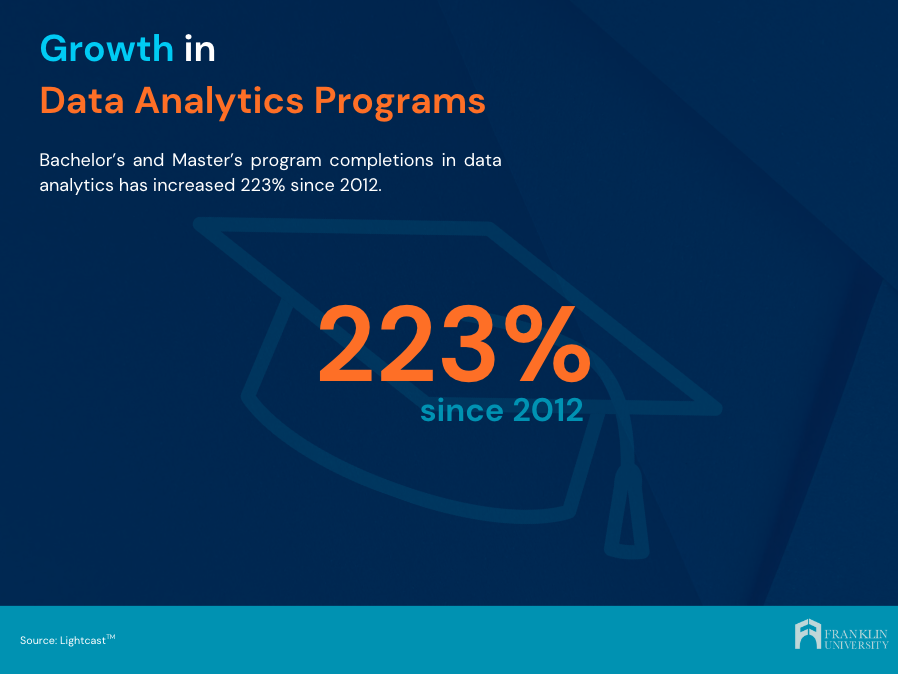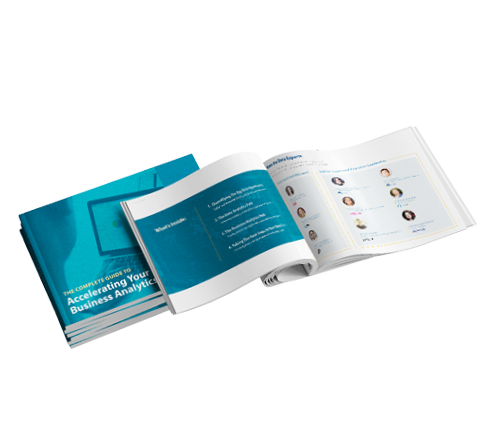Request Information
We're Sorry
There was an unexpected error with the form (your web browser was unable to retrieve some required data from our servers). This kind of error may occur if you have temporarily lost your internet connection. If you're able to verify that your internet connection is stable and the error persists, the Franklin University Help Desk is available to assist you at helpdesk@franklin.edu, 614.947.6682 (local), or 1.866.435.7006 (toll free).
Just a moment while we process your submission.

How to Get Into Data Analytics
For anyone considering data analytics as a career field, opportunities are plenty and industry growth isn’t slowing down anytime soon. According to labor analytics firm Lightcast, data scientist positions saw an increase of 5.9% from 2022-2023, well above the industry average growth of 2.9%. This positive trend has spawned a boom of academic and career resources available to those wondering how to get into data analytics.
Now is a great time to consider the benefits of a career transition and pursue the growing field of data analytics.
What is Data Analytics?
According to Dr. Nimet Alpay, Ph.D., program chair of M.S. in Data Analytics at Franklin University, data analytics is, “the scientific process of transforming data into insight for making better decisions and offering new opportunities for a competitive advantage. This scientific process includes collecting, organizing, transforming and modeling data to identify patterns, and communicating findings to stakeholders.”
Statistical, mathematical, computational and domain-specific techniques are used by data analysts during this process to derive useful, meaningful information from available datasets.
Five Potential Benefits of Getting into Data Analytics
For anyone considering how to get into data analytics as a possible career track, there are several professional benefits to consider when weighing your options.
1. Strong Job Outlook
While data scientists positions grew by 5.9% from 2022-2023, the Bureau of Labor Statistics (BLS) reports that employment for data scientists is projected to grow 35% from 2022 to 2032, much faster than the average for all occupations. About 17,700 openings for data scientists are projected each year, on average, over the decade. It’s clear that existing demand will continue to grow, yet the supply of professionals ready to fill these positions is not keeping pace, which gives qualified candidates an even greater advantage as organizations seek out new talent.
The strong growth rate of data scientist positions, paired with a national median salary of $103,501, make it a strong career option to pursue.
Other related job positions in the field of data analytics saw the following growth from 2022-2023, according to Lightcast™:
- Statistician (4.83%)
- Management Analysts (2.95%)
- Postsecondary Teachers (1.72%)
- Computer Programmers (1.01%)
There are a wide variety of professional positions available that utilize data analytics. A great way to discover what’s out there is browse data analyst job descriptions, and job descriptions for the above listed positions, to determine what’s available that sparks your interest.
Get a FREE roadmap that includes insider information to help you maximize the many opportunities in the fast-growing field of Big Data.
2. Early Adopters of Impactful Technology
Data analysts tend to be early adopters of advanced technical tools, spotting upcoming trends and serving as key stakeholders for positive change. Their proactive recommendations and insights to decision makers position them as critically important members of any team.
3. More Than Just Technical Know-How
Beyond coding, statistical knowledge, and modeling skills, a career in data analytics involves much more than meets the eye.
As an interdisciplinary field, effective teamwork and positive collaboration between experts from various fields is a must. Always directed toward the ultimate goal, a data analyst or data scientist determines the right questions to ask of all parties involved to uncover hidden information in complex datasets. These questions provide the data analyst with the answers that will guide them in crafting a recommendation to stakeholders on next steps and decisions to be made. The process requires strong communication skills, as clear and direct communication are key to project success and effectiveness.

4. A Variety of Companies Hire Data Professionals
As companies from a wide variety of industries rely more and more on data to fuel their business strategy, data scientists are in high demand from many companies. According to LighcastTM, companies that fall within these categories are most likely to hire data scientists and similar positions related to data analytics:
- Computer systems design and related services
- Management of companies and enterprises
- Management, scientific and technical consulting services
- Scientific research and development services
- Insurance carriers
- Software publishers
5. Remote Flexibility
If you’re hoping to secure a remote position in data analytics, the basic supply and demand economic equation is in your favor.
According to Dr. Alpay, “with the back-to-office moves after the pandemic, many companies are trying to find ways to attract qualified data analysts for the open positions. Companies still offer many remote or hybrid positions for data analysts since the demand for such qualified employees is quite high.”
3 Steps To Get into Data Analytics
There are several steps you can take to pursue a successful career in data analytics, even if you have no prior experience.
1. Enroll in formal education.
To match the rapid growth of data analytics in the field, formal education opportunities have followed suit with data analytics bachelor’s and master’s program completion growing 223% since 2012 (Source: LightcastTM). Until recently, those pursuing data-focused careers had to enroll in traditional degree programs such as mathematics, statistics, biostatistics, economics, computer science and computer engineering. In our rapidly changing world, many educational institutions have responded to the demand for data analytics with more tailored program offerings.

At Franklin University, students pursuing an online bachelor's degree in data analytics can specialize in one of three areas:
- Applied data science – Learn to solve contemporary business challenges through the application of technical skills in programming, cloud computing and data management.
- Business analytics – Fuel data-based decision making and problem solving by combining foundational knowledge of data analytics and business insights.
- Healthcare analytics – Get comprehensive training in healthcare management, informatics and systems that will enable you to leverage data for difference-making results.
Interested in taking your career to the next level? Franklin University offers an online data analytics master’s degree that can be completed in 19 months and includes coursework in statistics, programming, data management, data visualization, data mining, machine learning and advanced analytics.
2. Develop relevant technical skills through training and experience.
While exact technical skills may vary from job posting to posting, here is a list of common technical skills you may find in a data analyst job description and how frequently they appear in LightcastTM reported job postings.
- SQL (19%)
- Workflow management (14%)
- Microsoft Excel/Office (12%)
- Java (8%)
- Python (7%)
- SAS (6%)
- Tableau (6%)
- R (4%)
According to Dr. Alpay, additional required technical skills include statistical skills such as building and explaining models, machine learning skills, data mining skills and data visualization skills.
Searching for part-time internships or entry-level, project-based contracts is a great way to develop these technical skills. Bolstering your experience allows you to learn more about the industry while experiencing first hand what a career in data analytics looks like before committing to formal education or more extensive training.
If you’d like to pursue training, Franklin University offers a fully online data analytics certificate program that sharpens these skills in as few as eight months. And, if you decide a full degree program is right for you, by earning the certificate, you've already earned half of the credits required for the master's degree.
3. Network with data analytics experts.
If you already know someone who works in data analytics, interview them to gain valuable insight into the pros and cons of the position and field. Ask to shadow them for a couple of hours while they work so that you can see exactly the type of tasks they perform on a typical day.
LinkedIn is also a valuable tool to leverage for connecting with data analytics experts you don’t already know. Follow their LinkedIn activity to observe the type of content they post and interact with, and connect with them to ask questions and perhaps set up a meeting to chat about the field.
Many companies, such as Women in Analytics, Academic Data Science Alliance, American Statistical Association and Digital Analytics Association host LinkedIn business pages that you can follow for information and to get involved.
“Analytics at Franklin” is a LinkedIn group that connects Franklin students with advisory board members, faculty and experts from the industry. Group members also have access to job postings, professional development events, seminars, talks and meetup events.
Data Analytics Opportunities at Franklin University
If you are interested in getting into data analytics, an online degree at Franklin University is a great place to start. Offering a B.S. Analytics-Applied Data Science, M.S. in Data Analytics and a data analytics certificate program, Franklin University is a flexible option to pursue data analytics while continuing to work or care for family.
In addition to receiving a quality degree, all data analytics students at Franklin University are connected to industry professionals, such as academic advisor board members who are willing to regularly invest time into their education. These industry professionals and experts from the data science and data analytics fields are invited as program guest speakers to deliver real world insight into the industry, a valuable asset to anyone looking to get into a career in data analytics.





